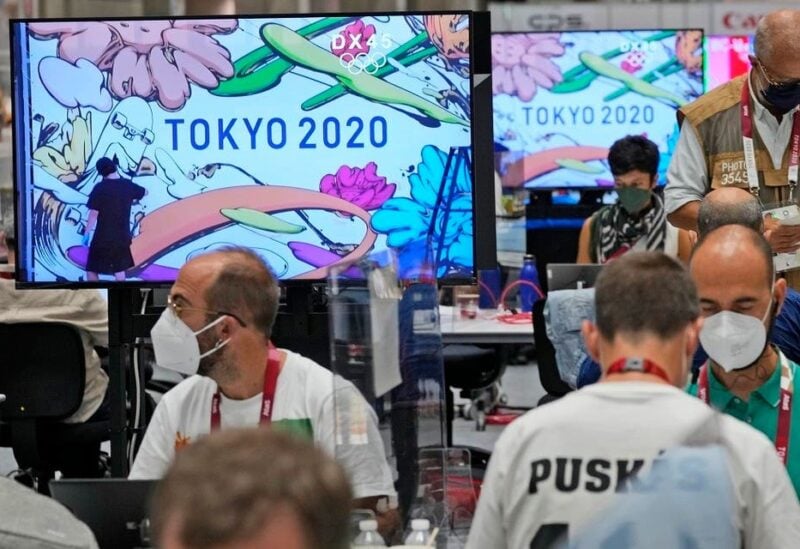
Journalists work as the making of a Tokyo 2020 mural is shown on television screens at the main press center of the 2020 Summer Olympics, on July 23, 2021, in Tokyo, Japan. (AP)
Japan’s economy declined somewhat quicker than expected in the third quarter, as a dramatic increase in local COVID-19 cases hampered individual consumption and a worldwide chip supply deficit harmed business morale.
The worsening downturn is a disappointment for officials who had hoped that relieving supply shortages and loosening pandemic controls would promote a rebound in the world’s third-largest economy this quarter.
Japan’s GDP shrank by 3.6 percent year on year in July-September, according to updated Cabinet Office figures released Wednesday, worse than the earlier assessment of a 3.0 percent drop.
The result, which was worse than experts’ consensus projection of a 3.1 percent decrease, equates to a real quarter-on-quarter contraction of 0.9 percent from the previous quarter, compared to a preliminary 0.8 percent drop.
“This shows that economic circumstances remained stagnant in the July-September quarter,” said Itochu Economic Research Institute’s head economist, Atsushi Takeda.
Because of the recurrence of the coronavirus, growth has slowed.”
The speedier reduction was mostly due to a higher drop in private consumption, which accounts for more than half of GDP and fell 1.3 percent from the previous three months, which was worse than the initial estimate of a 1.1 percent drop.
According to a government official, consumption declined as a result of bad weather keeping customers at home and a global chip shortage affecting sales of autos and devices owing to production difficulties.
“A significant decrease in durable goods (spending) suggested that auto production cuts had a significant impact,” said Wakaba Kobayashi, an economist at Daiwa Institute of Research.
According to the official, durable goods expenditure fell 16.3 percent quarter on quarter, the most since 1994, when comparable statistics first became available, lowering household consumption by 0.7 percentage points.
The figures indicated that public investment fell 2.0 percent, versus the first projection of a 1.5 percent reduction, while capital spending fell 2.3 percent from the previous quarter, compared to a 3.8 percent preliminary drop.
Exports had no net contribution to GDP change since they were offset by imports. Meanwhile, domestic demand contributed 0.9 percentage point to GDP contraction, matching a prior contribution.
The GDP decrease, which took into account a change in how seasonal adjustments were calculated, comes after statistics on Tuesday revealed that household expenditure declined for the third month in a row in October.
However, in a more recent evidence that consumption has increased, a sentiment index of “economy watchers,” or employees who follow consumer and retail trends, soared to an eight-year high in November.
Since the outbreak of the epidemic, Japan’s government has attempted to assist the country’s weak economy with large-scale fiscal expenditures. Last month, it revealed a record $490 billion package.
Analysts expect expenditure to increase as a result of the spending package, with Daiwa’s Kobayashi expecting a favorable impact in the first quarter of next year.
“We anticipate that the stimulus package will improve Japan’s GDP by roughly 2% through increasing private consumption, government expenditure, and public investments,” she added.